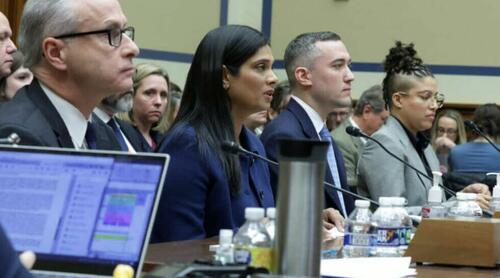
Authored by Julie Kelly via AmGreatness.com,
They sure don’t make tyrants like they used to.
Tyrants once rose to power the old-fashioned way: defeating the opposition on the battlefield or at the faux ballot box. Despite their atrocities, these despots at least had some swagger—perhaps a way with the ladies, a good sense of humor, strong persuasive abilities, commanding verbal skills, pride in their appearance.
Not so with modern-day martinets. Our 21st-century tyrants possess nothing more than useless degrees from woke institutions and deep contempt for at least half the country, likely born out of a lifetime of social isolation. History, after all, shows that outcasts often seek revenge against their childhood tormentors later in life.
Such appears to be the case with the former Twitter executives who testified before the House Oversight Committee on Wednesday. Unimpressive by every measure—looks, personality, intellect, persuasiveness, grasp of the facts—the Twitter Four should serve as a reminder of what the defenders of freedom are up against. Thankfully, our enemies, while powerful for now, have the mental, physical, and emotional appeal of overcooked spaghetti.
Alex Wong/Getty Images
James Baker, Vijaya Gadde, Yoel Roth, and Anika Collier Navaroli took the quasi-stand this week at a House Oversight Committee hearing to explain their roles in colluding with the government to suppress free speech during an election year, particularly related to the New York Post’s coverage of the Hunter Biden laptop story in October 2020. Baker, the former general counsel for the FBI when the bureau used fabricated political opposition research to defraud a secret federal court and obtain a warrant to spy on Donald Trump, was fired by Elon Musk as Twitter’s general counsel after it was discovered Baker was vetting company files made available to independent journalists.
Roth, Gadde, and Navaroli were considered the “custodians of the internet,” Roth boasted in a New York Times opinion column published in November, shortly after he resigned. “The work of online sanitation is unrelenting and contentious,” Twitter’s former head of “trust and safety” lamented. Roth then outlined a series of steps the government, private companies, and Big Tech oligarchs should pursue to rein in Musk.
“In the longer term,” Roth warned, “the moderating influences of advertisers, regulators and, most critically of all, app stores may be welcome for those of us hoping to avoid an escalation in the volume of dangerous speech online.”
That sort of hubris was on full display this week as the Twitter Four defended their crusade to censor users on the Right, including the suspension of Trump in January 2021. In the process, these self-proclaimed warriors of truth and integrity revealed themselves to be nothing short of petulant foot-stompers unfit for employment anywhere outside of Silicon Valley or the government. Further, all four were clearly guided by their hatred for Trump and his supporters, contrary to their solemn assurances that decisions were based on unbiased considerations to protect the site from insidious content.
For example, Gadde retweeted a Nicholas Kristof piece in 2016, emphasizing Kristof’s conclusion that he had “never met a national politician in the U.S. who is so ill informed, evasive, puerile and deceptive as Trump.” She, like 98 percent of people working in Silicon Valley, is a generous contributor to Democratic Party officials and candidates.
She reportedly cried when she learned Musk had acquired the company.
But Gadde’s attempts to hide her partisan stripes failed this week. In a nonsensical explanation only an Ivy Leaguer could love, Gadde told committee members about the inner workings of the social media giant.
“Defending free expression and maintaining the health of the platform required difficult judgment calls,” claimed Gadde, who was largely responsible for the decision to ban Trump’s account after January 6, 2021. “Most applications of Twitter rules were fact-intensive, subject to internal debate, and needed to be made very quickly. We recognized that after applying those rules, we might learn that some of them did not work as we had imagined and that we would need to update them. At times, we also reversed course.”
Coincidentally, just like occurrences in the traditional media, those rules and course reversals only affected one side: the Right. But when challenged to explain the imbalance, Gadde played dumb. She said she could only “make a guess” as to the application of a “search blacklist,” a tool that was frequently used by Twitter to hide the accounts of conservative influencers.
Vaccine-injured Representative Nancy Mace (R-S.C.) angrily confronted Gadde about Twitter’s censorship of contrary views on COVID-19, especially vaccine efficacy. After forcing Gadde to admit she did not graduate from medical school, Mace presented tweets with CDC data on vaccine side effects that Twitter nonetheless labeled “misleading.”
Gadde told Mace she was “not familiar with those particular situations,” to which Mace snarked, “Yeah, I bet you’re not.”
Roth, a big talker behind the scenes and on the op-ed pages of regime-friendly newspapers, sheepishly confessed he “regret[s] the language he used” in some tweets including one that referred to the president and his administration as “actual Nazis.” He then complained that he was subjected to threats after Musk shared what Roth insisted was a “defamatory allegation that I support or condone pedophilia.” Roth said he was forced to sell his house in the aftermath.
Anika Collier Navaroli perhaps best portrayed the emotional fragility and overall duncery of these social media tyrants. The “safety policy team senior expert” worked for months before January 6 to “minimize the threat of violence that we saw coming.” Part of the looming danger, Navaroli claimed, was Trump’s comment for the Proud Boys to “stand back and stand by”—a remark not made on Twitter but during a presidential debate in September 2020.
Navaroli, now a fellow at Stanford University’s Center for Critical Race and Digital Studies, sprang into action. “We crafted what we called a coded incitement to violence policy to address dog whistles like this,” she told the committee. Rather than follow her orders, Navaroli complained, Twitter “bent over backwards to find ways not to approve it.”
She continued her pressure campaign to remove Trump until the events of January 6. “Two days later, when it looked like it was going to happen all over again, I asked management whether they wanted more blood on their hands,” Navaroli said. “Only then did they act.”
Navaroli seemed to detect danger in everything Trump said. “The former president said he liked to send out his tweets like little missiles. To me, that sounded like weaponization of a platform in his own words and yet Twitter was not concerned.”
She left Twitter in March 2021 after her paranoid fantasies got the best of her. Navaroli told the January 6 select committee she “could no longer be complicit in what I saw to be a company and a product that was wantonly allowing violence to occur. [The] platform was going to continue to allow people to die, and I could not be a part of that.”
Just like the tyrants of old, this current crop hides its lust for power behind a cloak of fairness and the “common good.” No, they’re not cutting off food supplies or building labor camps but these modern-day tyrants seek the same ends: crush the opposition and control the masses.
Just with a lot less talent.
Authored by Julie Kelly via AmGreatness.com,
They sure don’t make tyrants like they used to.
Tyrants once rose to power the old-fashioned way: defeating the opposition on the battlefield or at the faux ballot box. Despite their atrocities, these despots at least had some swagger—perhaps a way with the ladies, a good sense of humor, strong persuasive abilities, commanding verbal skills, pride in their appearance.
Not so with modern-day martinets. Our 21st-century tyrants possess nothing more than useless degrees from woke institutions and deep contempt for at least half the country, likely born out of a lifetime of social isolation. History, after all, shows that outcasts often seek revenge against their childhood tormentors later in life.
Such appears to be the case with the former Twitter executives who testified before the House Oversight Committee on Wednesday. Unimpressive by every measure—looks, personality, intellect, persuasiveness, grasp of the facts—the Twitter Four should serve as a reminder of what the defenders of freedom are up against. Thankfully, our enemies, while powerful for now, have the mental, physical, and emotional appeal of overcooked spaghetti.
Alex Wong/Getty Images
James Baker, Vijaya Gadde, Yoel Roth, and Anika Collier Navaroli took the quasi-stand this week at a House Oversight Committee hearing to explain their roles in colluding with the government to suppress free speech during an election year, particularly related to the New York Post’s coverage of the Hunter Biden laptop story in October 2020. Baker, the former general counsel for the FBI when the bureau used fabricated political opposition research to defraud a secret federal court and obtain a warrant to spy on Donald Trump, was fired by Elon Musk as Twitter’s general counsel after it was discovered Baker was vetting company files made available to independent journalists.
Roth, Gadde, and Navaroli were considered the “custodians of the internet,” Roth boasted in a New York Times opinion column published in November, shortly after he resigned. “The work of online sanitation is unrelenting and contentious,” Twitter’s former head of “trust and safety” lamented. Roth then outlined a series of steps the government, private companies, and Big Tech oligarchs should pursue to rein in Musk.
“In the longer term,” Roth warned, “the moderating influences of advertisers, regulators and, most critically of all, app stores may be welcome for those of us hoping to avoid an escalation in the volume of dangerous speech online.”
That sort of hubris was on full display this week as the Twitter Four defended their crusade to censor users on the Right, including the suspension of Trump in January 2021. In the process, these self-proclaimed warriors of truth and integrity revealed themselves to be nothing short of petulant foot-stompers unfit for employment anywhere outside of Silicon Valley or the government. Further, all four were clearly guided by their hatred for Trump and his supporters, contrary to their solemn assurances that decisions were based on unbiased considerations to protect the site from insidious content.
For example, Gadde retweeted a Nicholas Kristof piece in 2016, emphasizing Kristof’s conclusion that he had “never met a national politician in the U.S. who is so ill informed, evasive, puerile and deceptive as Trump.” She, like 98 percent of people working in Silicon Valley, is a generous contributor to Democratic Party officials and candidates.
She reportedly cried when she learned Musk had acquired the company.
But Gadde’s attempts to hide her partisan stripes failed this week. In a nonsensical explanation only an Ivy Leaguer could love, Gadde told committee members about the inner workings of the social media giant.
“Defending free expression and maintaining the health of the platform required difficult judgment calls,” claimed Gadde, who was largely responsible for the decision to ban Trump’s account after January 6, 2021. “Most applications of Twitter rules were fact-intensive, subject to internal debate, and needed to be made very quickly. We recognized that after applying those rules, we might learn that some of them did not work as we had imagined and that we would need to update them. At times, we also reversed course.”
Coincidentally, just like occurrences in the traditional media, those rules and course reversals only affected one side: the Right. But when challenged to explain the imbalance, Gadde played dumb. She said she could only “make a guess” as to the application of a “search blacklist,” a tool that was frequently used by Twitter to hide the accounts of conservative influencers.
Vaccine-injured Representative Nancy Mace (R-S.C.) angrily confronted Gadde about Twitter’s censorship of contrary views on COVID-19, especially vaccine efficacy. After forcing Gadde to admit she did not graduate from medical school, Mace presented tweets with CDC data on vaccine side effects that Twitter nonetheless labeled “misleading.”
Gadde told Mace she was “not familiar with those particular situations,” to which Mace snarked, “Yeah, I bet you’re not.”
Roth, a big talker behind the scenes and on the op-ed pages of regime-friendly newspapers, sheepishly confessed he “regret[s] the language he used” in some tweets including one that referred to the president and his administration as “actual Nazis.” He then complained that he was subjected to threats after Musk shared what Roth insisted was a “defamatory allegation that I support or condone pedophilia.” Roth said he was forced to sell his house in the aftermath.
Anika Collier Navaroli perhaps best portrayed the emotional fragility and overall duncery of these social media tyrants. The “safety policy team senior expert” worked for months before January 6 to “minimize the threat of violence that we saw coming.” Part of the looming danger, Navaroli claimed, was Trump’s comment for the Proud Boys to “stand back and stand by”—a remark not made on Twitter but during a presidential debate in September 2020.
Navaroli, now a fellow at Stanford University’s Center for Critical Race and Digital Studies, sprang into action. “We crafted what we called a coded incitement to violence policy to address dog whistles like this,” she told the committee. Rather than follow her orders, Navaroli complained, Twitter “bent over backwards to find ways not to approve it.”
She continued her pressure campaign to remove Trump until the events of January 6. “Two days later, when it looked like it was going to happen all over again, I asked management whether they wanted more blood on their hands,” Navaroli said. “Only then did they act.”
Navaroli seemed to detect danger in everything Trump said. “The former president said he liked to send out his tweets like little missiles. To me, that sounded like weaponization of a platform in his own words and yet Twitter was not concerned.”
She left Twitter in March 2021 after her paranoid fantasies got the best of her. Navaroli told the January 6 select committee she “could no longer be complicit in what I saw to be a company and a product that was wantonly allowing violence to occur. [The] platform was going to continue to allow people to die, and I could not be a part of that.”
Just like the tyrants of old, this current crop hides its lust for power behind a cloak of fairness and the “common good.” No, they’re not cutting off food supplies or building labor camps but these modern-day tyrants seek the same ends: crush the opposition and control the masses.
Just with a lot less talent.
Loading…






